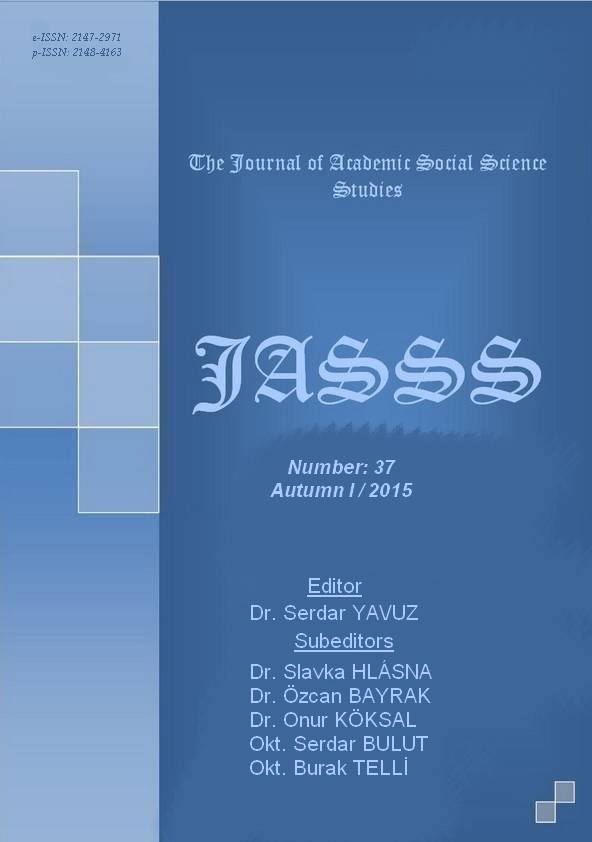Author :
Abstract
Türk toplumu % 7,6 yaşlı nüfus oranıyla (TÜİK,2013) "yaşlı toplum" kategorisinde değerlendirilmektedir. Bu değerlendirmenin pek çok anlamından biri, pratikte yaşlı bakımı problemi ile yüz yüze olmamızdır. Türkiye'de 2005 yılına kadar olan dönemde hükümet politikaları yaşlılara yönelik kurumsal bakım hizmetlerini öne çıkarırken, bu dönemden sonra evde bakım hizmetleri daha çok tercih edilmeye başlanmıştır. Evde bakım, hükümetler ve yaşlılar bakımından bazı cazip yönleri olmasına rağmen, sorunsuz değildir. Sorunlar daha çok, yaşlı ebeveynleri ve evde onların bakım sorumluluğunu üstlenen yetişkinleri ilgilendirmektedir. Son yıllarda, yaşlı bakımıyla ilgili sorunlar sosyal bilimlerin farklı alanlarında inceleme konusu edilmektedir. Bu araştırmada, yaşlı bakımı cinsiyet değişkenine göre incelenerek yaşlı bakımının cinsiyetçi karakterinin ortaya konulması amaçlanmıştır. Bu amaçla, Afyonkarahisar'da ikamet eden ve 85 ve üzeri yaş grubundaki yakınına bakan 177 yetişkin üzerinde araştırma yapılmıştır. Bu kişilere nicel araştırma kapsamında yüz yüze görüşerek anket uygulanmıştır. Elde edilen veriler, sosyal bilimler için geliştirilmiş olan SPSS istatistik programında değerlendirilmiştir. Araştırma sonucunda görülmüştür ki, cinsiyet ile yaşlı bakımını üstlenme sorumluluğu arasında ilişki vardır ve bu ilişkide, ataerkil değerler ile düşük sosyo-ekonomik seviye etkilidir. Ayrıca, örneklem grubundaki kadınlar evde yaşlı bakımı sorumluluğu üstlenmiş olmaktan dolayı bazı sosyal ve psikolojik problemler yaşamaktadırlar. Bununla birlikte, örneklem grubundaki kadınların yaşlı bakımı sorumluluğuyla ilgili tutumu erkeklere göre daha eşitlikçi bir nitelik taşımaktadır.
Keywords
Abstract
With the %7.6 (TUİK, 2013) percentage of elder population rate Turkish society is taken in the category of “old society”. One of the many meanings of this evaluation is that we are face to face with the problem of the eldercare. Although until 2005 the governmental policies highlight the institutional services of care, after the date the domestic care comes to the forth as the most preferred option. However, domestic care has some appealing aspects both for the governments and the elders, it can’t be taken as trouble-free. Troubles mostly related with the elder ones and those who undertakes the care of them. Last years the troubles according to the eldercare are seen as problematic in different domains. In this work it is intended to elaborate the sexual position of the eldercare with respect to the gender variable. Therefore it is conducted a survey with the 177 participant inhabiting in Afyonkarahisar who are taking the care of a family member aged above 85. A questionnaire form applied them with the method of face to face conversation. The data taken by them is evaluated by the computer program spss which is developed for the social science usage. As it seen at the end of the research that there is a relationship between the gender and the responsibility of the undertaking of the eldercare. And the patriarchal values and low socio-economical levels are effective in this relation. Also because of the responsibility of eldercare, women experience some social and psychological problems. Besides it, the attitudes of women in the sample group about the responsibility of eldercare are carry an egalitarian quality when compared with that of the men.





